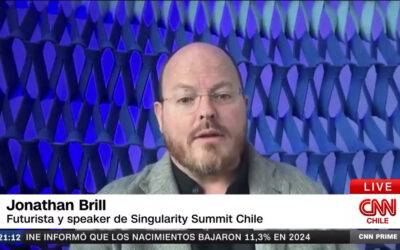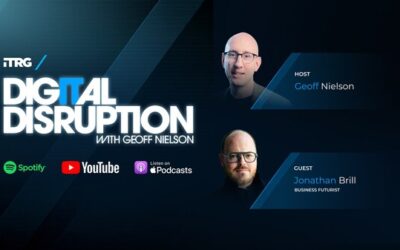Reprinted from the San Francisco Business Times
HP Global Futurist Peers Into Our Uncertain Future
by Jim Gardner
As we struggle to make sense of an uncertain future, who better to talk to than someone who helps some of the biggest names in the world economy make sense of theirs?
That would be Jonathan Brill, who holds an official title at tech giant Hewlett-Packard as “global futurist,” and a similar, if unofficial role, for an assortment of other corporate titans. The job, he said, is more or less the same for all of them: To look 10 years or so out, and identify the trends and events that could metastasize into business-altering risks or opportunities.
“People say you can’t predict the future,” Brill told me. “But you can know a lot about it.”
Take, for instance, a deadly pandemic blowing up out of nowhere, quickly encircling the globe and enfeebling societies and economies as it does.
To which Brill says, in not so many words: Called it.
That’s not to say that he, or anyone, predicted the specific emergence of Covid-19 from Wuhan, China, as 2019 waned. It doesn’t work that way, Brill explained. Rather, by teasing the likelihoods out of history, demographics, global trends and events, he analyzes what the first- and second-order effects would be. When the downside effects are scarily outsized, it’s an accident waiting to happen. Like this one.
“This was not a black swan,” he said. “This was a likely event.”
In almost every detail.
For one thing, a pandemic is a “known risk” through the annals of human history, he said, even if there hasn’t been one in a century. For another, previous outbreaks with pandemic potential have emerged from China with almost regularity, most involving relatives in the coronavirus family. Global connectedness amps up the risk of global contagion. The statistical probabilities were very much on the side of history repeating itself, but with our luck running out at some point.
So if Brill’s hindsight is 20-20, what does his foresight say?
Mainly, that we are going to be dealing with ripple effects of the coronavirus for a very long time. “This is the driver of the next decade,” he said.
Flattening the curve, reopening the economy, even the advent of a vaccine — these are merely the opening scenes in a long-running drama, Brill forecasts.
Governments will need to continue to spend trillions of dollars years into the future underpinning badly damaged economies, even as they know that by piling on the debt, they are eating the seed corn of their own economic growth. They just won’t have much choice.
That will escalate international tensions, not just between rich countries and poor, but between creditor nations and debtors, particularly within the European Union.
Those hoping the coronavirus might tame the ambitions of China are likely to be disappointed, Brill thinks, to the point that a direct military standoff between the U.S. and China is foreseeable before the end of this decade.
Closer to home, Brill notes that every major disruption since the Industrial Revolution has led to major changes in the social contract — this one may see citizens demanding more long-term help to safeguard their health and well-being. Ideas like universal basic income could enter the mainstream.
“We’re about to be at the edge of that,” he said. “I thought Andrew Yang was ahead of the curve by seven to 10 years. Turns out it’s more like seven to 10 days.”
Most of Brill’s clients range from $20 billion in revenue and up: “Below that, doing a lot of long-term planning doesn’t make a lot of sense.” There is, surprisingly, a small club of upper echelon corporate soothsayers who traverse the globe to look into the futures of the corporate elite: “Less than 10,” he said. “We all know each other.”
But one of Brill’s proudest projects was on a far smaller scale, for an acquaintance who owns a farm somewhere in the U.S., with revenue in the low millions. A few years ago, Brill helped him game out potential threats to his business and craft a business plan that would respond to them.
“A shock like this where the economy dropped out, this was in the plan,” Brill said. “He had a playbook in place.”
Today, he said, the farmer is doing just fine.
Jim Gardner is managing editor of the San Francisco Business Times.



